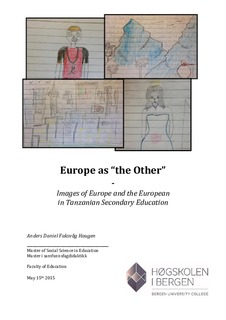Europe as “the Other” - Images of Europe and the European in Tanzanian Secondary Education
Master thesis
Published version
Permanent lenke
http://hdl.handle.net/11250/2496255Utgivelsesdato
2015-05-15Metadata
Vis full innførselSamlinger
Sammendrag
The presentations of “the others” have been a concern in the global North since Edward
Said’s Orientalism (1978) and the start of the post-colonial debate. This Master’s thesis is
a study of the images of Europe and the European presented in social science subjects in
Tanzanian secondary education, and how these images coincide with common
Tanzanian perceptions of the European found through the word Mzungu. The study was
structured after three levels of curricula as described by John I. Goodlad (1979), taking
the formal, teacher, and student perspectives. In Tanzanian secondary education,
Europe and the European are presented through examples focusing on the differences
between Europe and Tanzania, contributing to exotic and positive images of the
European. These images reflect the content of the word Mzungu, representing an
idealized picture of the European, and strengthen Tanzanians’ perceptions of the
dichotomous relationship between themselves and the European. Fremstillinger av “de andre” har vært et anliggende for det globale Nord helt siden
Edward Saids bok Orientalismen (1978) og starten på den postkoloniale debatten.
Denne masteroppgaven er en studie av hvordan Europa og det europeiske fremstilles i
samfunnsfag i ungdomsskolen og videregående skole i Tanzania, og hvordan disse
fremstillingene samsvarer med vanlige tanzanianske oppfatninger av det europeiske
gjennom bruken av ordet Mzungu. Studien er bygget opp rundt tre nivåer av pensum
som beskrevet av John I. Goodlad, og presenterer det formelle (læreplanens), lærernes
og elevenes perspektiv. I ungdomsskolen og videregående opplæring i Tanzania
presenteres Europa og det europeiske gjennom eksempler som fremhever forskjellene
mellom Europa og Tanzania, noe som bidrar til eksotiske og positive fremstillinger av
det europeiske. Disse fremstillingene reflekterer innholdet i begrepet Mzungu, som
representerer et idealisert bilde av det europeiske, og styrker tanzanianernes
oppfatning av motsetningsforholdet mellom dem selv og det europeiske. Utambulisho wa “neno wao” ni mojawapo ya dhana zenye kuvuta hisia za watu walio
wengi katika dunia ya iliyoendelea tangu wakati wa Edward Said’s Orientalism (1978)
na miaka ya hivi karibuni baada ya ukoloni.
Katika thesis hii nimejikita katika kuchunguza mtazamo juu ya bara Ulaya na watu toka
Ulaya kama inavyoainishwa katika masomo ya ya sayansi ya ya jamii ngazi ya sekondari
nchini Tanzania. Sambamba na hilo, utafiti huu unajikita pia kubaini ni kwa namna gani
mtazamo huo unaenda sanjari na neno Mzungu, neno linalotumika na watanzania
waliowengi kuwatambulisha watu kutoka Ulaya.
Mtililiko mzima wa Utafiti huu ni matokeo na marejeo ya mtaala rasmi pamoja na
mtazamo wa mwalimu na mwanafunzi kuhusu aina ya mitaala kama ilivyoelezewa na
kuchambuliwa na John I. Goodlad (1979).
Matokeo ya utafiti huu yanayonyesha kuwa, kwa ujumla wake bara la Ulaya pamoja na
watu wake wanatazamwa kwa mtazamo rafiki na chanya. Hii inajidhiirisha wazi pale
ambapo wanafunzi wanapokuwa katika kujifunza tofauti kati ya Ulaya na Tanzania .
Mifano inayotolewa pamoja na mtazamo huakisi maana – maudhui ya neno Mzungu
linalowasilisha picha halisi ya watu wa Ulaya, mtazamo na mahusiano yaliyopo kati yao
na watanzania waliowengi.
Maneno Makuu: Dikotomia, Ulaya, Tanzania, Aina, Mzungu , Goodland, Mtaala
Beskrivelse
Masteroppgave i samfunnsfagdidaktikk

